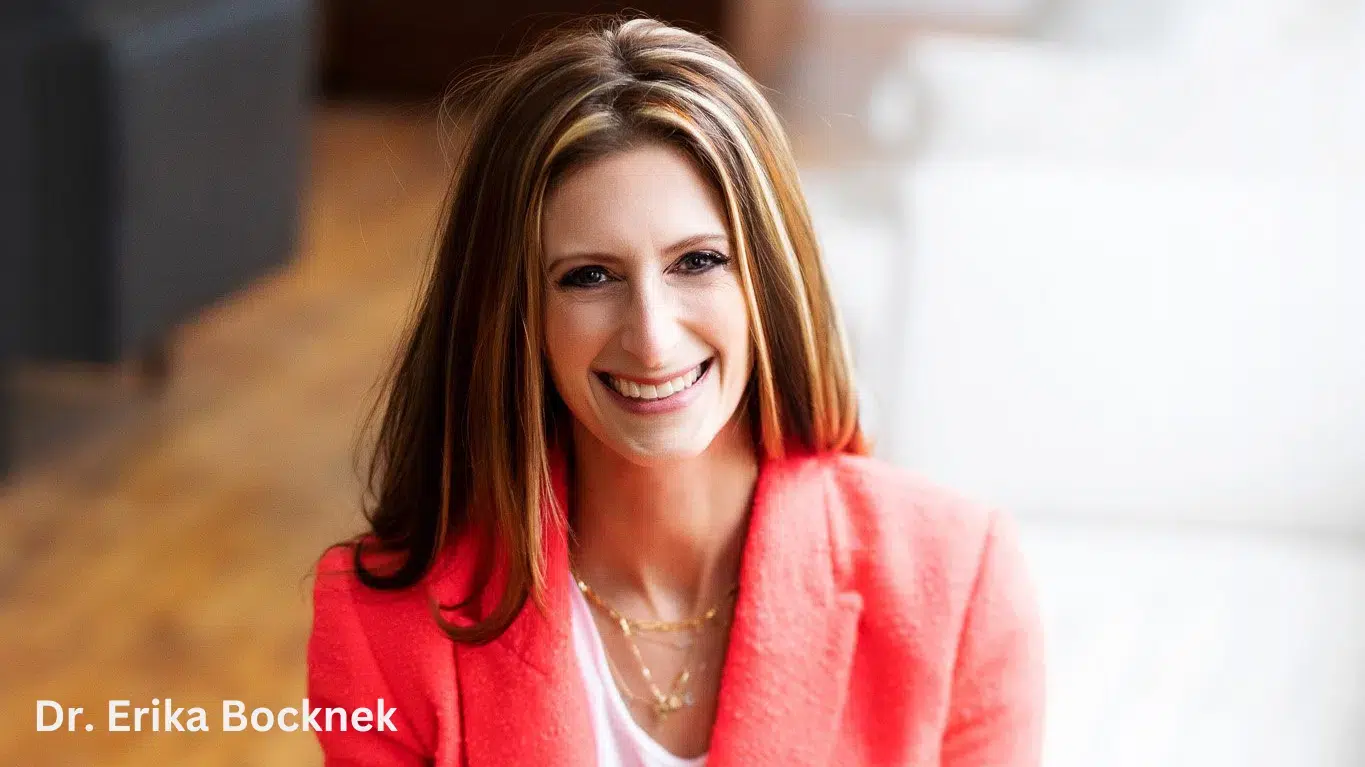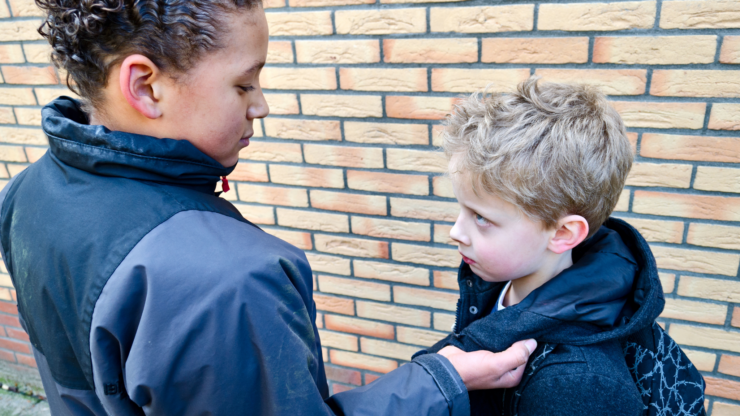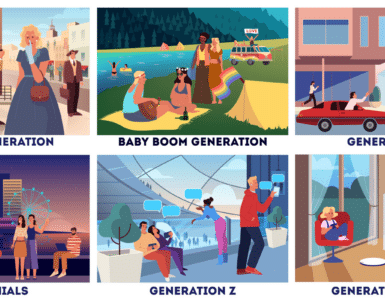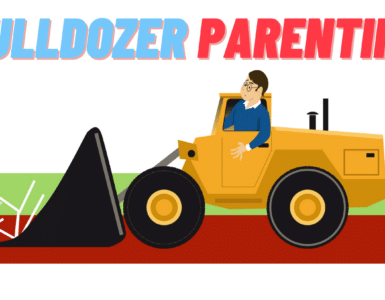As parents, we often grapple with concerns about our children’s friendships and the potential impact their friends may have on them. It becomes even more challenging when we discover that our child is friends with someone we perceive as a “bad influence.”
Conversely, there are instances where we realize that our child’s behavior is becoming problematic and influencing others negatively.
In both situations, it is crucial to approach them with empathy, open communication, and a focus on nurturing healthy relationships.
Parentology recently met with Dr. Erika Bocknek, a licensed Marriage and Family Therapist with a Masters degree from the University of Connecticut, a PhD from Michigan State University, and postdoctoral training from Louisiana State University and Michigan Medicine.
We explored practical strategies to address the intricate dynamics of friendship, influence, and personal growth.

Recognizing the “Bad Influence”
In this scenario, your child has numerous friends, but you’ve noticed one of them engaging in behaviors that don’t align with your family’s values.
“What if my child is in a friendship with someone who appears to have a lot of control over my child’s behavior?” says Dr. Bocknek. “My child appears either afraid to stand up to them, or has some sense that if they don’t show up for that friend, something terrible is going to happen, or feels like they’re the only friend and have to always be there for them, or has been made to feel that the bad influence friend is all they have.”
She suggests approaching this situation with wonder and open communication.
“What do you notice about that person? What happens when they do X, Y, or Z? Stand back a lot,” says Dr. Bockneck. Engage your child in conversations about their observations of their friend’s behavior, and encourage them to be self-aware of their own values. “Encourage your child to be really self-aware about their own values, to listen really closely to their own instincts. How does it make you feel on the inside when that person smarts off to the teacher?” she says.
By fostering mindfulness and awareness, you empower your child to make informed choices about their friendships and develop the necessary skills to manage discomfort within a social group. “You do want to empower your child to be aware of signals that somebody is who you affiliate with, somebody who’s not who you affiliate with, and then develop complex behavioral skills around how you manage that.”
When Your Child Mimics Problematic Behaviors
If your child is in a close friendship where they are adopting behaviors and traits that don’t align with your family’s values, Dr. Bocknek advises against becoming the opposite force.
“This is actually a really good learning opportunity for your child to coexist with people who behave in ways that don’t match them,” she says. “We are a cooperative social learning species, and we have the capacity to mimic other people because that’s affiliative. But we also have the capacity to mindfully choose who we mimic. You want to empower your child to be aware of signals that somebody is who you affiliate with, somebody who’s not who you affiliate with, and then develop complex behavioral skills around that.”
She suggests showing genuine interest in understanding the positive aspects of the friend that your child is attracted to. This approach allows you to learn more about the friend, identify specific behaviors of concern, and open a non-judgmental conversation with your child. By maintaining a trusting and supportive relationship, you can help your child navigate their own choices and build self-awareness.
Dealing with Power and Control Dynamics
When your child appears to be in a friendship where the other person has a significant amount of control over their behavior, Dr. Bocknek emphasizes the importance of trust, agency, and clear communication. Begin by expressing your concern and asking your child how they feel about the friendship.
“They’re choosing this person. They’re attracted to this person in some way. And there’s something about the relationship that is, in fact, positive,” she suggests. “This is a good opportunity to look at shared space. If you really like this friend, there must be things that you believe in about them or like about them. And I’m curious because I don’t know them very well. Tell me about those things. Take a chance to learn.”
ALSO: Expert Family Therapist on Spring Cleaning Your Parenting
Believe their feelings and experiences, even if they might be hiding something. Create an environment where your child feels safe discussing their emotions and decision-making process. It is crucial to have an established foundation of trust, values, and open dialogue before intervening in situations where power and control dynamics are at play. “What you’re trying to do is not disrupt the friendship, not even necessarily yet have an opinion on it. What you’re trying to do is set up an environment where we can talk about things,” says Dr. Bocknek.
Supporting Positive Friendships and Building Wide Social Circles
Dr. Bocknek emphasizes the significance of supporting and nurturing positive friendships in your child’s life. “You cannot be your child’s only system of support in this life,” she says. “Engage with other people who love your child. Family, friends, if they’re at the right age. Talk to your child about peers who are good influences. Ask if we can bring those people in more intentionally.”
By fostering a network of caring relationships, you enhance your child’s ability to discern between harmful and loving individuals, allowing them to navigate friendships more effectively. “You’re teaching your child to be a good, critical thinker and decision-maker, and a responsible member of a community,” she says. “You’re also teaching your child to be a person with opinions and boundaries.”
Teaching Consequences, Impact, and Intentions
Dr. Bocknek introduces the concept of empathy-driven parenting, where we acknowledge that there is a good reason behind every behavior. However, this does not excuse harmful actions or behaviors. When addressing problematic behavior, it is essential to strike a balance between recognizing consequences, impact, and intentions.
We should guide our child to recognize the impact of their behavior on others and take responsibility for their actions. It is crucial to establish clear boundaries and model behavior that emphasizes the importance of considering impact and intention.
“You want your child to understand that they have choices. And when they’re in a relationship where somebody is asking them to make a choice that’s not consistent with their own values, they can say no,” she says. “You want to be teaching your child this is the kind of person I’m willing to give up a lot for. And this is the kind of person I’m not.”
ALSO: What’s the Hardest Thing About Being a Single Mom?
Dr. Bocknek emphasizes the importance of acknowledging both impact and intention, as well as the need for mentorship and supportive relationships. Instead of solely focusing on punitive consequences, we should create a culture where values are front and center. By engaging in mentoring relationships with our children, we help them understand the significance of their actions, learn from their mistakes, and develop strategies for future interactions.
Guide your child through discussions about the impact of their behavior on others, emphasizing values and empathy. “You can have the conversation about what you’re noticing, and then ask them, ‘How do you think that person is feeling right now?'” Dr. Bocknek says. Encourage them to learn from their actions and develop healthier coping mechanisms, while maintaining a supportive and loving relationship. “It’s important to teach your child that you are available and open to conversations about friendships, no matter what,” she says.
Empowering Our Children: Key Takeaways
Throughout all three scenarios, the underlying principles remain the same: foster open communication, encourage self-awareness, and empower your child to make choices based on their values. Here are some essential takeaways:
- Foster Wonder and Self-Awareness: Engage your child in conversations that promote self-reflection and critical thinking about their relationships and their own feelings.
- Emphasize Shared Space: Rather than polarizing your child’s friendships, seek to understand the positive aspects that attract them to their friends. By genuinely learning about their friends’ qualities, you can build bridges and foster understanding.
- Support Decision-Making: Help your child make informed decisions by discussing potential consequences and encouraging them to align their choices with their own values.
- Recognize Complicated vs. Problematic: Distinguish between complex behaviors that may be harmless or situational and genuinely problematic behaviors that may require intervention.
- Intervene in Power and Control Dynamics: If your child is in a friendship where power and control dynamics are evident, it is essential to intervene and seek professional guidance if necessary.
Navigating friendships with a bad influence can be a challenging task for parents, but with practice, it is possible to adopt an approach that fosters open communication, self-awareness, and values-driven decision-making in our children. Through wonder, trust, and support, we can empower our children to make informed choices about their friendships and develop the necessary skills to manage discomfort within a social group. Remember, as parents, our role is to guide and support our children, rather than dictate their choices or isolate them from potential challenges.
By implementing these strategies and maintaining open lines of communication with your child, you can navigate the complexities of friendships with bad influences.
“It’s important for your child to develop assertiveness skills and the ability to set boundaries in friendships,” says Dr. Bocknek. “You want to help your child build resilience and confidence in making decisions that align with their own values and beliefs.”
Remember that every child is unique, and the approach may vary based on their age, maturity level, and individual circumstances. Ultimately, your goal is to empower your child to make responsible decisions while providing a safe and supportive environment for their growth.
As parents, we play a crucial role in guiding our children, but it is essential to remember that we are not infallible. Seeking guidance from professionals or considering family therapy can provide valuable support when facing challenging situations. Remember, it is not about perfection but about creating a safe and nurturing environment where our children can learn, grow, and thrive.
By embracing the journey, fostering strong relationships, and prioritizing open and honest communication, we can navigate the complexities of friendships alongside our children. Together, we can equip them with the skills and resilience needed to make positive choices, form meaningful connections, and lead fulfilling lives.
Remember to be patient, maintain a loving relationship with your child, and seek professional help if needed. Together, you can help your child navigate the complexities of friendships and foster their personal growth and well-being.









Add comment